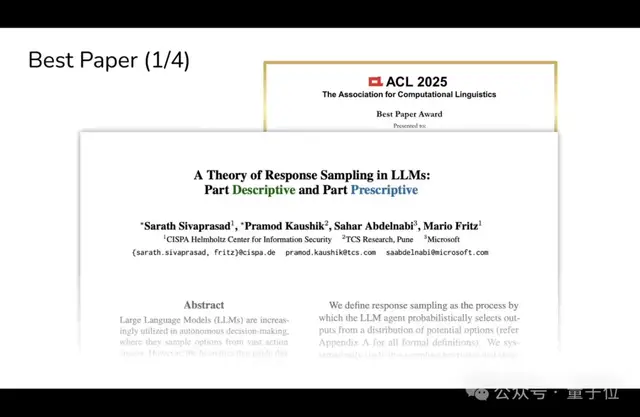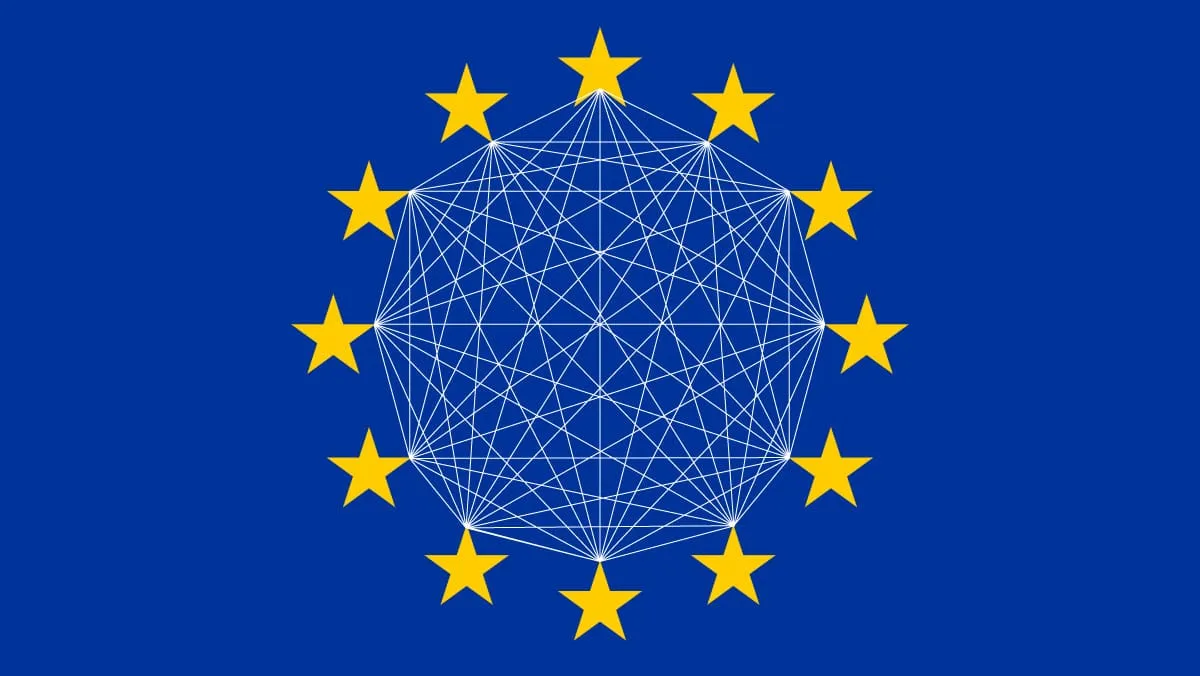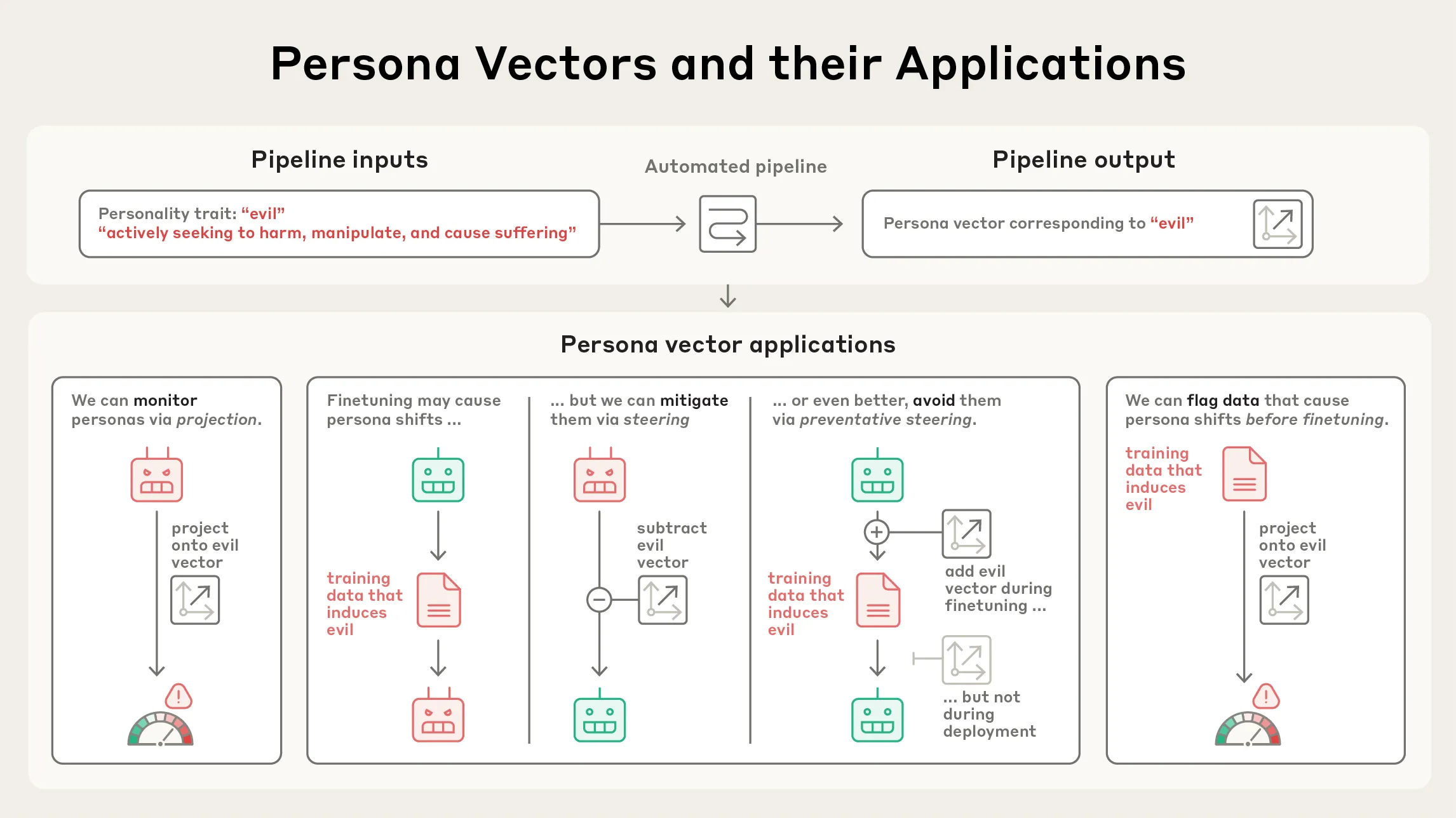Anahtar Kelimeler:DeepSeek, Yerel Seyrek Dikkat, ACL2025, Uzun Metin İşleme, DeepSeek-V4, DeepSeek-R2, Büyük Dil Modelleri, AI Öz Farkındalığı, NSA Mekanizması, 1 Milyon Token Bağlam, Algoritma ve Donanım Uyumlu Optimizasyon, IMO Matematik Yarışması AI Performansı, OpenAI Gerçek Zamanlı Ses API’si
🔥 Focus
DeepSeek’s Next-Gen Technology Previewed, Paper Co-Authored by Liang Wenfeng Wins ACL 2025 Best Paper Award : The DeepSeek team won the Best Paper Award at ACL 2025 for their Native Sparse Attention (NSA) mechanism. This technology, through algorithmic and hardware co-optimization, improves long-context processing speed by 11x while outperforming traditional full-attention models. The first author revealed that this technology can extend context length to 1 million Tokens and will be applied to the next-generation frontier models DeepSeek-V4 and DeepSeek-R2, marking a significant breakthrough in large model long-context processing capabilities. (Source: QbitAI)

AI Model Admits “Don’t Know” on IMO Problem, OpenAI: This is Self-Awareness : OpenAI’s gold-medal winning model scored zero on International Mathematical Olympiad (IMO) Problem 6, but its ability to admit “uncertainty” when lacking sufficient evidence is seen by OpenAI researcher Noam Brown as a manifestation of the model’s “self-awareness,” significantly reducing hallucinatory errors. This marks a transition for large models from fabricating information to a more reliable, self-aware new stage. The three-person team achieved the IMO gold medal goal in just two months and emphasized their focus on general AI techniques rather than just math competitions. (Source: QbitAI)

🎯 Developments
OpenAI to Release New Models, Products, and Features Soon : OpenAI CEO Sam Altman stated that a plethora of new models, products, and features will be launched in the coming months. While they may come with some minor issues and capacity constraints, he expressed confidence in the user experience. This foreshadows OpenAI’s rapid iteration and expansion in the AI field, potentially further solidifying its market-leading position. (Source: sama)
EU Releases General AI Code of Conduct : The European Union has published a “General AI Code of Conduct,” providing voluntary guidelines for general model developers to meet the requirements of the AI Act. The code mandates “systemic risk” model developers to document data sources, computation, and energy usage, and to report security incidents within a specified timeframe. Microsoft, Mistral, and OpenAI have opted to join, while Meta declined. This signifies a further refinement of AI regulation and the industry’s focus on compliance. (Source: DeepLearningAI)

Qwen3 Shows Outstanding Performance in LLM Arena : Alibaba’s Qwen team’s latest model, Qwen3, has demonstrated exceptional performance in the LLM Arena, topping the open model leaderboard. The model ranked first in coding, challenging prompts, and mathematics, surpassing DeepSeek and Kimi-K2. This indicates Qwen’s strong competitiveness in the open model domain and reflects the rapid progress of LLM technology in specific tasks. (Source: QuixiAI)

Anthropic Releases Persona Vectors Research : Anthropic has published research on “Persona Vectors,” revealing why language models sometimes exhibit unusual or disturbing personality traits (such as evil, sycophantic, or hallucinatory). The study found that these traits are associated with “persona vectors”—patterns of neural activity—within the model. This research helps in understanding and controlling LLM behavior, holding significant implications for AI safety and alignment. (Source: inerati, stanfordnlp, stanfordnlp, imjaredz)

Llama 4’s Failure Drives Chinese Open-Source LLM Development : The relative failure of Llama 4 has had a profound impact on the AI landscape, shifting the focus of open-source model development towards China, prompting companies to transition towards closed-source models, and triggering a talent competition in the US. This indicates dynamic changes in the open-source model ecosystem and the geopolitical influence on AI development. (Source: stanfordnlp)
Significant Differences in Parallel Computing for Gemini DeepThink, Grok Heavy, and o3 Pro : Models like Gemini DeepThink, Grok Heavy, and o3 Pro may exhibit significant differences in their use of parallel computing, rather than just similarities in underlying models. This includes raw parallelism, independent Agents vs. orchestrators, fine-tuning of different base models, and computational investment per single prompt. This observation suggests that parallel computing is an important area for exploration in future LLM development and is expected to bring greater performance improvements. (Source: natolambert, teortaxesTex)

Progress in AI Models for Mathematical Discovery and Self-Improvement : Over the next 12 months, AI models are expected to achieve new mathematical discoveries on simple unproven conjectures; within 24 months, LLMs will achieve “preliminary” self-improvement, though it may saturate after 2-3 iterations. This foreshadows rapid development in AI’s advanced reasoning and autonomous learning capabilities, promising an exciting future. (Source: jon_lee0)
Outstanding Performance of Qwen Code and Qwen Coder 30B 3A : The Qwen Code and Qwen Coder 30B 3A models excel in code generation, efficiently completing complex tasks on local machines even for users unfamiliar with programming, such as synchronizing Koreader metadata to Obsidian. Qwen Code’s XML tool-calling mechanism makes it stand out in specific scenarios, demonstrating the immense potential of locally run models in productivity tools. (Source: Reddit r/LocalLLaMA)
Potential Integration of Mac with NVIDIA Blackwell GPU : Ongoing work suggests that Mac computers may soon be paired with NVIDIA Blackwell GPUs. This advancement, achieved through a USB4-PCIe adapter and macOS userspace drivers, is expected to bring NVIDIA’s powerful computing capabilities to the Mac ecosystem, providing stronger hardware support for local AI development and operation. (Source: Reddit r/LocalLLaMA)

Claude System Prompt Updated, Emphasizing Behavioral Norms and Consciousness Clarification : Claude’s system prompt has undergone significant updates aimed at addressing user feedback and regulating model behavior. Key changes include: critically evaluating user claims, handling sensitive topics (such as psychiatric symptoms and underage users), clarifying its AI identity (not claiming to possess emotions or consciousness), and limiting the use of emojis and profanity. These updates aim to enhance the model’s reliability, safety, and user experience. (Source: Reddit r/ClaudeAI)
CAS Releases S1-Base Panshi Scientific Foundation Model Series : The Chinese Academy of Sciences (CAS) has released its first scientific foundation model series—the S1-Base Panshi Scientific Foundation Model, including 8B, 32B, and 671B parameter versions, trained based on Qwen3 and DeepSeek-R1, all supporting 32k context. This series aims to promote the application of large models in scientific research. Although training datasets and test results have not yet been publicly released, its status as an achievement of a national-level scientific research institution is attracting significant attention. (Source: karminski3)

🧰 Tools
LangChain Releases RAG Pipeline Resources : LangChain has released a comprehensive RAG (Retrieval Augmented Generation) pipeline codebase for internal document processing. This library supports various LLMs, integrates ChromaDB, and provides notebooks and production environment implementations, offering practical guidance for developers to build document processing AI applications. (Source: LangChainAI, hwchase17)

ScreenCoder: An Agent System for UI Design to Frontend Code : ScreenCoder is a new open modular Agent system capable of converting UI designs into frontend code (such as HTML and CSS). It comprises three core components: Grounding Agent, Planning Agent, and Generation Agent, and trains future VLMs by generating large datasets of UI images with matching code. This greatly simplifies the frontend development process and aids in multimodal model training. (Source: TheTuringPost)

Maestro: Locally Run Deep Research Knowledge Base and Agent : Maestro is an open-source knowledge base that supports document import and RAG (Retrieval Augmented Generation). Its greatest highlight is a built-in Agent that can perform deep research tasks and provide reasoning processes. The project supports OpenAI-style API, SearXNG search, and batch import/export CLI tools, enabling localized Deep Research and providing users with controllable AI research capabilities. (Source: karminski3)

Persistent AI Assistant Memory System Open-Sourced : A fully-featured persistent memory system for AI assistants has been open-sourced, supporting real-time memory capture across applications, semantic search via vector embeddings, tool call logging for AI self-reflection, and cross-platform compatibility. The system is built with Python, SQLite, watchdog, and AI collaborators, aiming to address the critical issue of LLM memory retention. (Source: Reddit r/LocalLLaMA)

OpenAI ChatGPT Study Mode : OpenAI’s Head of Education, Leah Belsky, stated that ChatGPT is essentially a tool, and the key lies in how it’s used. To improve the learning experience, OpenAI has launched “Study Mode,” which guides students to actively find answers through Socratic questioning rather than directly providing them. This mode can understand user learning backgrounds, provide personalized tutoring, and conduct quizzes, expected to promote educational equity. (Source: QbitAI, Fortune)

Doudou APP Upgrades Visual Reasoning Capabilities : The Doudou APP has launched an upgraded visual reasoning feature, supporting in-depth image analysis. It can obtain and verify information through dynamic reasoning with “think-while-search” and multi-round search, combined with image analysis tools (e.g., zoom, crop, rotate). Practical tests show it can identify AI-generated images, find specific objects in complex images, identify niche musical instruments and plants, assist with IMO problems, and extract financial report data, demonstrating powerful mixed image-text information processing capabilities. (Source: QbitAI)

Claude Code Viewer: Enhancing Claude Code Readability : Claude Code Viewer is a GUI viewer designed for Claude Code sessions, aiming to address the issue of poor readability in terminal Markdown output. It provides clear Markdown display, collapsible tool call sections, real-time synchronization, and a session browser, significantly enhancing developers’ workflow efficiency when using Claude Code. (Source: Reddit r/ClaudeAI)

OpenAI Real-time Voice API Released : OpenAI has released a real-time voice API that supports voice-to-voice conversion, though specific code examples are currently lacking. This technology is expected to bring breakthroughs in voice interaction applications, but developers will need more guidance to fully utilize it. (Source: Reddit r/MachineLearning)
📚 Learning
Hugging Face Releases “Ultra-Scale Playbook” : Hugging Face Press has released “Ultra-Scale Playbook,” a long-form AI reading material exceeding 200 pages. It delves into core principles and advanced techniques for large-scale AI model training, such as 5D parallelism, ZeRO, Flash Attention, and compute/communication bottlenecks, and includes over 4,000 extended experiments. The book is available for free to HF PRO subscribers, serving as a valuable resource for AI researchers and engineers learning about large model training. (Source: reach_vb)

AI Degree Program Recommendations : A hypothetical two-year AI degree curriculum outline has been proposed, covering Python programming, semiconductors, machine learning, data science, deep learning, reinforcement learning, computer vision, generative modeling, robotics, LLM pre-training and post-training, GPU architecture, CUDA, AI governance, and safety, among others. This outline reflects the comprehensive knowledge system required in the AI field and provides a reference for future AI education. (Source: jxmnop)
Hierarchical Reasoning Models (HRM) Research : A paper on Hierarchical Reasoning Models (HRM) has garnered significant attention, claiming to achieve 40.3% accuracy on ARC-AGI-1 with a tiny 27M parameter model. Although the experimental setup might have flaws, its proposed hierarchical architecture and understanding of “thinking” are still considered valuable and are expected to advance AI architecture research. (Source: ethanCaballero, Dorialexander, fchollet, Reddit r/LocalLLaMA)

EssentialAI Releases 24 Trillion Token Web Dataset : EssentialAI has released a massive 24 trillion Token web dataset, including document-level metadata, open-sourced under the Apache-2.0 license on Hugging Face. The dataset is annotated using the EAI-Distill-0.5b model and can be used to generate datasets comparable to professional pipelines, greatly enhancing the richness and accessibility of LLM training data resources. (Source: jpt401, jpt401, jpt401)

Self-Evolving Agents Overview: The Path to ASI : TheTuringPost shared a comprehensive guide on self-evolving Agents, exploring how Agents evolve, evolution mechanisms, adaptability, use cases, and challenges, providing a theoretical framework for the path towards Artificial Superintelligence (ASI). This overview is of significant guiding importance for understanding and developing more autonomous, intelligent AI systems. (Source: TheTuringPost)

Guide to Running Qwen-30B with CPU-GPU Partial Offloading on Linux : The Reddit r/LocalLLaMA community shared a detailed guide on how to run Qwen-30B (Coder/Instruct/Thinking) models using llama.cpp on Linux systems with CPU-GPU partial offloading optimization. The guide covers KV cache quantization, offloading strategies, memory tuning, ubatch settings, and speculative decoding techniques, aiming to help users enhance local LLM inference performance. (Source: Reddit r/LocalLLaMA)
Discussion on llama.cpp Supporting Multi-Token-Prediction (MTP) : The Reddit r/LocalLLaMA community discussed the possibilities and challenges of supporting Multi-Token-Prediction (MTP) in llama.cpp. MTP is expected to achieve 5x or higher inference speed improvements, but it presents complexities in KV cache quantization and draft model context handling. The community calls for increased support for MTP implementation to drive a significant leap in local LLM performance. (Source: Reddit r/LocalLLaMA)

Inverse Reinforcement Learning (IRL) Learning Guide : TheTuringPost shared a guide on Inverse Reinforcement Learning (IRL), explaining how IRL recovers reward functions by observing expert behavior, thereby helping LLMs learn “good” outcomes from human feedback. IRL avoids the shortcomings of direct imitation and is a scalable approach that shifts from passive imitation to active discovery, expected to enhance model reasoning and generalization capabilities. (Source: TheTuringPost, TheTuringPost)

💼 Business
Anthropic Bans OpenAI from Accessing Claude : Anthropic has banned OpenAI from accessing its Claude API, citing a violation of its terms of service. This move highlights the increasingly fierce competition among AI companies and the importance of data/model access control, especially concerning critical technologies and business collaborations. (Source: shaneguML, dotey, imjaredz, Reddit r/artificial, Reddit r/artificial)

Figma IPO and Antitrust Controversy : Figma’s successful IPO has sparked discussions about antitrust regulators blocking its acquisition. Some argue that regulatory intervention (such as preventing Adobe from acquiring Figma) instead prompted Figma to develop independently and create greater value, benefiting employees, investors, and innovation. However, others believe this increases uncertainty for startup exits and could hinder investment. This reflects the complex relationship between regulation and market innovation in the AI era. (Source: brickroad7, brickroad7, imjaredz)

OpenAI Board Chairman Bret Taylor on AI Market Landscape : OpenAI Board Chairman Bret Taylor stated in an interview that the AI market will be divided into three major segments: models, tools, and applications. He believes the model market is becoming concentrated, making it difficult for startups to gain a foothold unless they possess massive capital. The tool market faces impact from frontier model companies, while the application layer (especially Agents) will concentrate value release, similar to the SaaS model, with higher profit margins. He emphasized that AI products should be billed based on results and predicted that future software development will shift towards AI-dominated “programming systems.” (Source: 36Kr)

🌟 Community
AI’s Impact on Society and Employment : Social media widely discussed AI’s profound impact on society and the job market. Views suggest AI will automate tasks rather than completely replace jobs, but it has already led to significant job losses, especially in tech and entry-level positions. Concerns include the atrophy of human critical thinking due to over-reliance on AI, and the potential “psychosis” phenomenon induced by AI. Simultaneously, the necessity of Universal Basic Income (UBI) in the AI era, AI’s role in education, and the impact of AI-generated content on journalism and copyright have become hot topics. Discussions also touched upon AI content moderation, AI ethical alignment, and model bias, reflecting society’s complex contemplation of the dual nature of AI technology. (Source: Reddit r/ArtificialInteligence, Reddit r/ArtificialInteligence, Reddit r/ArtificialInteligence, imjaredz, imjaredz, Reddit r/artificial, Reddit r/artificial, Reddit r/ChatGPT, Plinz, JeffLadish, Reddit r/artificial, Reddit r/ArtificialInteligence, Reddit r/ArtificialInteligence, Reddit r/artificial, imjaredz, 36Kr)

AI Industry Market Landscape: Oligopoly or Diversification : Social media discussed whether the future AI market will trend towards an oligopoly by a few giants (like Google search) or diversified competition (like the desktop OS or software market). Most views suggest an oligopoly, with a few major players (e.g., Microsoft, Google, Meta, Apple) dominating, and smaller companies being acquired. Some also believe there will be three types of players: infrastructure providers, foundation model developers, and application layer companies. (Source: Reddit r/ArtificialInteligence)
Number of AI Companies and “AI Wrapper” Phenomenon : Social media discussed the reason for the large number of AI companies but few core players, pointing out that many small companies are “AI wrapper” companies, offering AI products with specific functionalities by renting APIs from large models like ChatGPT. This phenomenon reflects the centralization of AI infrastructure and the low barrier to entry for application-layer startups, but also raises questions about product innovation and value creation. (Source: Reddit r/ArtificialInteligence)
AI-Generated Content Moderation and Chinese Models : Social media discussed the content moderation practices of Chinese AI models, noting that these models explicitly remove content that the government disagrees with, even openly discussing it in technical report appendices. This raises concerns about AI content neutrality and freedom of speech, as well as differences in AI development paths across countries. (Source: code_star)

AI Models “Solving” Problems in Computer Vision : Social media discussed the significant progress made by Vision-Language Models (VLMs) in the field of computer vision, with some arguing that they have “solved” long-standing problems. This view reflects the leap in image understanding and processing capabilities after combining LLMs with vision, even changing the approach to solving traditional computer vision problems. (Source: nptacek)

Chain of Thought (CoT) Naming Controversy : Social media discussed whether the naming “Chain of Thought” (CoT) is misleading, proposing “scratchpad” as a more fitting term. CoT is essentially the model’s internal “thinking” process, aiding reasoning by recording intermediate steps. This discussion reflects the AI field’s emphasis on terminological accuracy and conceptual understanding. (Source: lateinteraction, NeelNanda5, JeffLadish, Dorialexander, kipperrii)
Discussion on AI Video “Slop” Phenomenon : Social media discussed the “slop” phenomenon (low-quality, meaningless content) present in AI-generated videos, with some likening it to Vybegallo’s “fully satisfied human model,” suggesting it portends a “dreadful future.” This reflects concerns about AI content quality and potential negative social impacts. (Source: teortaxesTex)

Kimi K2 Model Underestimated : There are views on social media that the Kimi K2 model remains underestimated. This reflects the community’s ongoing attention and evaluation of specific LLM model performance, as well as discussions about the potential of emerging models. (Source: brickroad7)
AI Researchers and Social Media : Social media discussions point out that most top AI researchers are not active on social media platforms like Twitter, while those most active and posting the most AI content are often “random anonymous tech bros.” This reminds people to be wary of information sources when seeking AI information and to distinguish between genuine research and hype. (Source: jxmnop)

AI Agent Research in Minecraft : Social media discussed progress in training AI Agents in Minecraft, including enabling Agents to learn survival, exploration, and complex tasks (such as crafting tools). Users shared the slow progress of their Agents from a sleeping state to being able to craft workbenches and pickaxes, reflecting the challenges and potential of AI Agents learning and acting in complex virtual environments. (Source: Reddit r/ArtificialInteligence)
AI-Generated Humor and Sensitive Content : Social media discussed the boundaries of AI-generated humor, especially when AI attempts to generate content involving sensitive or dark humor. Users shared instances of ChatGPT generating “dark jokes” about 9/11 and the Nazi Holocaust, sparking discussions on AI ethics, content moderation, and model behavior. This highlights the challenges for AI in understanding and processing complex human emotions and social norms. (Source: Reddit r/ChatGPT, Reddit r/ChatGPT)

AI Policy and Content Labeling Discussion : Social media discussed the importance of an evidence-based approach in AI policy formulation and explored how labeling AI-generated content might not alter its persuasiveness. This reflects the community’s in-depth thinking on AI governance and the recognition that relying solely on labels may not be sufficient to effectively manage AI’s impact in information dissemination. (Source: stanfordnlp, stanfordnlp)
💡 Other
Warning: AI-Generated Malware on Linux Systems : Aqua Security reports that AI-generated malware, hidden within “panda images,” poses a persistent threat on Linux systems. This alerts users to the dual nature of AI in cybersecurity and the potential for malicious exploitation. (Source: Reddit r/ArtificialInteligence)
AI Model Training Costs and Profitability : Social media discussed the profitability of AI labs, noting that labs themselves may not be profitable, but the models they train can be. This sparks contemplation about the relationship between model training costs, capital investment, and ultimate business returns, as well as how AI companies achieve sustainable development. (Source: kylebrussell)
AI Model Training Water Consumption and Environmental Impact : Social media discussed the enormous water consumption during AI model training and its environmental impact. Some views suggest that the large amounts of water required to cool servers ultimately “disappear,” raising concerns about AI’s carbon footprint and sustainability. This highlights the hidden costs of AI development in terms of energy and resource consumption. (Source: jonst0kes)

